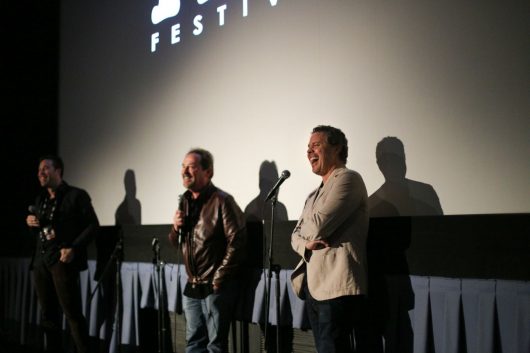Brad Kuhlman has produced content for major television networks like the Discovery Channel and Travel Channel, as well as the “Jerry Springer Show,” “Judge Judy” and MTV since graduating from Ohio State in 1991. Now, the alumnus is adding a self-directed independent documentary to his resume.
In 2016, Kuhlman met old friend Lou Dimaggio for lunch, and Dimaggio shared details about leaving his past life as a rising star in stand up comedy in New York City to write for television in Los Angeles and then always regretting that decision. Kuhlman said he immediately felt intrigued by the story, and so the idea behind “Where Have You Gone, Lou Dimaggio?” was born.
They spent that entire year making the documentary, and in January 2017, “Where Have You Gone, Lou Dimaggio?” played in its first independent film festival, the Santa Barbara International Film Festival. This month, the film was released publicly for purchase on iTunes and Amazon.
“For years, I had wanted to make a documentary and I felt like I never really came across the right story or material that would lend itself to being a good documentary,” Kuhlman said. “Once he told me [his story], the light bulb went on for me and I said to him at that lunch that we’re going to make this movie.”
Dimaggio said he didn’t think twice about it.
“It was definitely one of those moments where you just say yes, because you’re like, this is an opportunity to move forward,” he said.
Kuhlman said he was especially attracted to the idea because many of Dimaggio’s old colleagues from the iconic NYC comedy club “Catch A Rising Star” eventually became A-list celebrities, including Richard Belzer, Howie Mandel and Larry David.
When Kuhlman and Dimaggio created the framework of the film, Kuhlman said they decided to form the story around Dimaggio seeking advice from his famous friends on how to make a comeback in the standup comedy world by interviewing them, and then following the beginning of his comeback.
“I love the idea of him seeking advice from these famous comedians that thought Lou was hilarious and he was one of them [who could make it big],” Kuhlman said. “I thought there was something neat about that because as a viewer immediately you pay attention and want to know more about him because these famous people know and care about him.”
Kuhlman said one struggle was not knowing how many of Dimaggio’s friends would agree to be interviewed. Susie Essman and Joy Behar immediately agreed, so they just took a leap of faith and started filming, he said.
When David, the creator of Seinfeld, agreed to be interviewed, Kuhlman said that made a big difference in the path of the film because many others followed his lead and participated in an interview with Dimaggio.
Despite the details of Dimaggio’s own story, Kuhlman said he feels the message at the core of the documentary is transcendental.

Lou Dimaggio (center) and Brad Kuhlman (right) speak at a film festival about their documentary. Credit: Courtesy of Brad Kuhlman
“I feel like it was a relatable story to a lot of people who reach a certain age and look at their life and say, ‘Man, I’m not doing the thing I always felt like I wanted to do or should be doing, somewhere in life I took a turn and got off course,’” he said. “I think a lot of people can relate to that; and of course, I didn’t know how it would end up, but I felt like if we could capture that and make it relatable to people, then there’s a bunch of people who will get his story.”
Kuhlman said experience creating, directing and producing a documentary was also overwhelmingly positive, and he is open to making another documentary in the future.
“I feel confident that when the next [idea for a documentary] comes that I get passionate about because I feel like it’ll entertain people or relate to people, then I’ll for sure jump on it,” he said.



